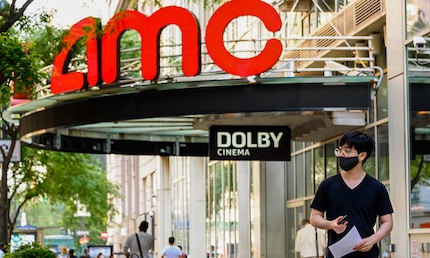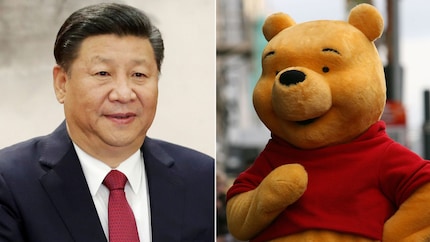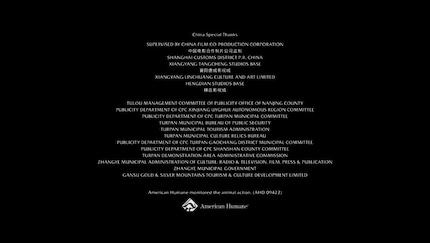
Review
Movie review: «Tenet» is confusing, overwhelming... and really good
by Luca Fontana

China's film industry is overtaking Hollywood. Industry experts are concerned. Hollywood could now bend even more to the will of a human-rights-violating government that’s not even its own. How did it come to this?
It's official: China now has the largest box office in the world. For the very first time. That’s what current box office figures say.
They’re from Artisan Gateway, one of the most influential agencies in China's motion picture industry. Specifically: in 2020, Chinese movie theatres made 1.99 billion dollars. North America is at 1.94 billion dollars. And the gap between the figures is expected to widen considerably by the end of the year.
No surprise there. At least not for industry experts. According to them, it was only a matter of time before the most populous country in the world had the biggest box office in the world. That’s basically the consensus summed up.
But: a pandemic was key in flipping the top of the pyramid.
Hollywood’s struggling. So is the box office. Especially in North America, where rising infection numbers are forcing more and more movie theatres to close their doors again, after having reopened just over a month ago.
The fact that Hollywood itself has decided to postpone many of its most important blockbusters until next year isn’t helping. Like «James Bond: No Time to Die» or «Dune». And «Black Widow». From the Hollywood accountants’ point of view, however, these are necessary postponements. Because how else are multimillion-dollar, large-scale productions supposed to even begin to recover their costs?
«Tenet» has shown that it’s simply not possible with barely filled movie halls; the sci-fi espionage clusterfuck, directed by Christopher Nolan, was also something of an experiment to see if there’s still a cinema audience during the pandemic. At least outside of China.
The result? Sobering. The Nolan film only grossed 50.6 million dollars within the USA. 334 million dollars, if you include international markets. And the film had hardly any competition. Under normal circumstances, the goal would’ve been to crack the one billion mark. «Tenet» probably would’ve managed it easily. In our current reality, the film won’t even bring in its estimated 400 million dollars in production costs, marketing included.
For Hollywood, the lesson to learn from this is clear: there’s no time like the future. Procrastination is the way to go. Even if it’s at the cost of the box office itself.
Hollywood's current pandemic-imposed strategy is making the US box office bleed. John Fithian, chief executive of the National Association of Theatre Owners, is deliberate with his words in this interview with the New York Times.
If the studios continue postponing all their releases, the movie theatres aren’t going to be there for those postponed releases.
Currently, only 48 percent of US cinemas are open, according to figures released by ComScore. The closure of cinemas at the behest of the US government in the state of New York is further squeezing down the number. This has repercussions for the entire country. Precisely because of the state’s size and cultural influence.
A spokesman for AMC, the largest cinema chain in America, and part of the Chinese Wanda Group since 2012, recently said they could run out of money by the end of the year. Afterwards, the survival of the cinema chain will depend on the further course of the pandemic and the associated postponements, the report concludes. By the way, this is a statement I’ve also personally heard from Pathé Switzerland. It’s probably applicable to most cinema operators in Switzerland.

Meanwhile, Regal Cinemas, the second-largest movie theatre chain in America, has announced the temporary closure of 663 cinema halls in the USA and Great Britain due to the pandemic. And Cinemark, the third-largest cinema chain after AMC and Regal Cinemas, is apparently not yet closing any movie halls, but is considering operating only a few hours a day, a few days a week.
If one of two things doesn’t happen, either Congress gives us substantial support quickly or New York gets open and the movies come back and the patrons come back, most of our companies are going to go under.
Fithian's call for help has not been received well in New York Governor Andrew M. Cuomo’s office. The fact there’s been no evidence of an increased risk of coronavirus transmission in cinemas – or at least not to the same extent as in bars or clubs – is apparently not a valid argument.
We’re moving heaven and earth trying to stop a second wave and people need to acknowledge that we’re still in a pandemic and start to act like it. We understand some people are unhappy but you know what? Better unhappy than sick or worse.
The picture emerging for cinema operators is a gloomy one.
At the moment, it looks like the US cinema industry is slowly but surely dwindling. There’s a fear of lasting structural damage – how many movie theatres will even be left by the end of the pandemic? The fewer the theatres, the fewer the potential ticket sales. And the weaker America’s box office compared to China’s, where an average of 20 to 25 new cinemas were being built every day before the pandemic.
This is another reason why film circles are now referring to China as Hollywood’s soon-to-be most important market. And then there are the streaming services, which have also been booming even more thanks to the coronavirus. So, who even needs the American motion picture anymore?
While the world is busy with the pandemic, China's box office is continuing to flourish. It’s even stealing the crown. Let's put it apolitically: the Eastern Kingdom has contained the pandemic more effectively than other countries. Fact is fact. And this particular fact is a blessing for the domestic film industry and box office.
Because over there, tens of thousands of movie halls are operating again at 75 percent of their typical capacity, despite protective measures. That’s not a bad percentage. Especially in comparison to North America, where regional protective measures allow an average maximum seating capacity of 20 to 40 percent. And then there’s the Chinese audience, who don't have too many COVID concerns and flock to the cinemas in droves.
Current figures really highlight this. In the month of October, China’s box office sold tickets worth over 585 million dollars. North America is at 21 million dollars. Worlds apart. And with «The Eight Hundred», China has also produced the most successful feature film of the year to date: the world-war epic has brought in 461 million dollars so far. Worldwide. With a cinema release in August.
«Bad Boys For Life», which previously topped the charts, was released before the lockdown in January. It currently stands at 427 million dollars. And that number won’t increase much more.
You don't need a degree in business administration to interpret the evidence: China is about to become the most important box office for Hollywood's film industry. But not only that: China could also soon be the most important box office in the world. If, due to the pandemic, it isn’t that already.
This is exactly what the experts fear.
Ignoring the pandemic, the «China-is-now-taking-over-the-box-office» trend is not new. It can be seen in the revenue from cinema tickets sold in different countries, i.e. the total revenue per year.
So, in 2019, North America was still the larger market. But, over the past decade, China's box office market has grown by about 962%. Meanwhile, North America’s has grown by 7%. Although China's growth has stagnated recently – and, of course, this year in particular – current studies still expect China to break the 22-billion-dollar threshold by 2025.
Coronavirus or not.

One of the Chinese box office’s strengths could actually be the lack of competitors like Netflix, Amazon Prime or Disney+. We have geoblocking to thank for that; all streaming services enter into licence agreements with the content creators. They can then only stream their content in countries in which they have an active licence.
For Western streaming providers, this doesn’t include China. At least not in most cases. That's why there's no Netflix in China. And also no Amazon Prime Video. But there’s Youku instead, pronounced «yóukù», which is Chinese for «excellent and cool». This is China's largest streaming service, with over 384 million subscribers. That’s over twice as many as Netflix has worldwide.
Hollywood, at any rate, recognised the potential of the Chinese box office a long time ago. Movies like «Warcraft», «Transformers: The Last Knight», «Pacific Rim: Uprising» or «Ready Player One» brought in more money in China than in America. Much more. Twice as much. And at the same time, revenue in China made up over half of the total overseas revenue.

For industry experts, one thing is clear: Hollywood is dependent on China. It has been for a long while. And now, with the pandemic ravaging Hollywood's domestic market, all the more so.
That right there is the crux of the matter.
These examples are the rule, not the exception. Especially for large-scale productions; large-scale productions that would have torn bloody financial holes in Hollywood’s bookkeeping, if not for the Chinese market – which, a mere ten years ago, didn’t even exist.
The Chinese government is taking note and reacting accordingly with protectionism: currently, a maximum of 38 foreign films per year are allowed to flicker across Chinese cinema screens. Officially, this is to protect the domestic – Chinese – film industry. Unofficially, another explanation makes a lot of sense: the Chinese government is very aware that Hollywood has no choice but to bow to the country's censorship, given its dwindling numbers.
It’s a kind of censorship with a serious disregard for human rights, freedom of speech and freedom of the press.
Take the movie «Bohemian Rhapsody», for example, starring Rami Malek as Freddie Mercury. All scenes showing Freddie Mercury’s homosexuality are missing. Even Malek’s Oscar acceptance speech was censored in China. The Elton John biopic «Rocketman», which was released a year later, was flat-out banned. Just like Marc Forster's zombie apocalypse «World War Z» a few years earlier. Because, as it turns out, Brad Pitt stars in that movie. And he’s been enjoying a general ban from Chinese cinema since his performance in the 1997 movie «Seven Years in Tibet».
China's censorship body knows no bounds, no matter how absurd; even outside of political issues. For example, «James Bond: Skyfall» was only shown in China once references to prostitution in Macau were removed from the film, and all reference to Chinese police violence was removed from the subtitles. There’s no such thing as police violence in China, after all. Nor in Hong Kong.

Then there’s «Mission Impossible: III»; Tom Cruise's Shanghai racing scene was cut, because the clothes hanging on clotheslines might – totally and completely understandably – cast a bad light on the country. I mean, who in the world would hang their clothes out to dry? Only barbarians, that’s who! And Disney's family flick «Christopher Robin» was even banned completely because some people on the Internet joked that Winnie the Pooh resembled Xi Jinping, President of China.

And where’s Hollywood in all this? Busy making absolutely no effort to oppose the censorship-blah of the Chinese Communist Party. In fact, quite the opposite. For there’s simply too much money to be made in the Land of Silk.
In the case of «Iron Man 3», for example, certain scenes were produced specifically for the Chinese market and the Chinese market only. In one such scene, two Chinese doctors talk about the upcoming, difficult operation on the broken Iron Man, aka Tony Stark. Should it not succeed and hence, Stark die, the world would blame the Chinese for the death of the popular hero. But, as the concerned head surgeon claims, Stark is first and foremost his friend. And while Stark’s busy taking care of the world, who’s taking care of Stark?
Why, I’m glad you asked. China, of course.
The latest example of Hollywood's submission: Disney's live-action version of the Chinese poem «Mulan». The film was shot in 2018 in various regions of China. Among others, in Turpan, a city in the east of Xinjiang. That’s around the same time reports of extrajudicial internment camps in the same region became known.
These reports detail over one million people having been detained for the purpose of «re-educating» Muslim minorities. Who are possibly still being re-educated. Against their will. On the agenda: forced sterilisation, abortion, birth control, torture and political indoctrination. All this, according to a regional campaign, to «create grounds for castigation and eradicate the spread of religious extremism».
Hollywood, i.e. Disney, not only filmed in that region, but also made a point of giving «special thanks» to eight Xinjiang government agencies in the credits. This includes the Turpan Public Security Bureau, which is directly connected to the internment camps. «It’s common [practice],» according to a statement made by Disney’s CFO. After all, all movies acknowledge the national and local authorities that granted the filming permits.

Was Disney aware of the serious human rights violations in the Xinjiang region at the time of shooting? No comment from Disney. Neither affirmative nor negative. Probably so as not to jeopardise the good relations with China. All it takes is one clumsily chosen political word. And recently, a new Disney Resort worth 5.5 billion dollars opened in Shanghai; an investment that must be protected.
Meanwhile, China has decided to ban any coverage of the film. Just like that. The nation should, of course, hear as little as possible about anti-humanitarian castigation camps in their own country.
And this is the way to go about it.
Because, as it turns out, Hollywood isn’t all that important for China’s box office. Not anymore. Gone are the days when American films accounted for over a third of the foreign movies shown in China. These days, that number is down to 16.8 percent. At the same time, the Chinese film industry is experiencing an unprecedented upswing.
The irony of it all is that Hollywood has brought this on itself.
Let's take a closer look at China's box office boom. It started about ten years ago. That’s back when the US government at the time intensified relations with China, together with Hollywood's Motion Picture Association – the association of the six big Hollywood studios: Paramount, Warner Bros, Sony, Disney, Universal and, since 2019, also Netflix.
The goal: to simplify Hollywood's entry into the Chinese market. From the studios’ point of view, in order to max out ticket sales. From the US government's point of view, perhaps to increase its own cultural influence on China. If people in China watch American movies featuring American products often enough, they may want to buy them.
The plan works. China relaxes its regulations. Ever so slightly. And just like that, the big studios are allowed to show their movies in China. With a pinch of censorship here, and a dash of financial support from shooting in China there.
Hollywood plays along; a good boy. Hollywood’s thought process: the nation will surely fall super in love with the movies, resulting in more power for the Americans in future negotiations. Because, if China were to stand its ground and ban Hollywood films outright, the Chinese government’s invisible hand would be revealed to the people. And that could lead to some social unrest. China would never take that risk.
It turns out, blockbusters like «Iron Man 3», «Fast & Furious» or «Independence Day» do, in fact, delight the Chinese enough to increase demand for new movie theatres. Over the span of just a few years, thousands of cinemas, multiplex chains and even IMAX halls are built all over the country. The Chinese box office is booming.
Which leads us to the first thing Hollywood failed to consider: the boom is also helping China’s film industry. Because more cinemas mean more income to invest directly in domestic film productions. Productions such as «The Wandering Earth», which is the first major Chinese-produced live-action sci-fi epic. A milestone in China's film industry.
And yes, the movie is on Netflix.
«The Wandering Earth» was so successful in 2019 that it made it to spot 13 of the worldwide box office – and that’s without an official North American release. The animated movie «Ne Zha» is one spot above it – another Chinese production without a North American release. And in case you forgot, this year, China produced «The Eight Hundred», the most successful movie of the year worldwide.
At the same time, American productions are losing ground in China's Top 10 movies of the year. Four years ago, there were still five US productions in China’s Top 10 of the year. In 2019, only two. The last «Star Wars» movie actually landed all the way down at spot 79. And this year, you won’t find a single US production in China's Top 10 list – this is the country in which «Warcraft» was once the third most successful movie of the year.
For the very first time, Hollywood has a true competitor to reckon with.
Because the Chinese audience seems to have become fed up with America’s putting on airs. The viewers prefer local productions and local actors they can identify with. Productions representing the values and propaganda of the Chinese government, financed by the revenues of former US blockbusters. Irony? What? Where?
And that brings us to the second thing Hollywood didn’t consider. Not even for a second. Namely, it’s not the Chinese government that will ban Hollywood films from its own cinemas. It’s the Chinese audience itself.
There goes the negotiating power. Poof.
Let’s summarise: China has replaced North America as the world's largest box office market. At least for the time being. Praise be to COVID.
What’s the probability of North America regaining the top position once the pandemic is over? Slim. On the one hand, because the pandemic will cause lasting damage to the box office, at least outside of China. And on the other hand, because Hollywood itself has made the Chinese film industry so strong.
The latter could have serious consequences for Hollywood. With China, Hollywood could have offset the resizing of its domestic market by «exporting» its own productions. But now that the Chinese are emancipating themselves from Hollywood – with a strong film industry of their own – the Maximum Credible Accident looms. Hollywood can't help but submit to the Chinese government. It’s damage control. And China, with its ever-present concern for human rights, will soon spearhead not only the box office, but also the film industry.
What awaits at the end of this road?
I write about technology as if it were cinema, and about films as if they were real life. Between bits and blockbusters, I’m after stories that move people, not just generate clicks. And yes – sometimes I listen to film scores louder than I probably should.
Interesting facts about products, behind-the-scenes looks at manufacturers and deep-dives on interesting people.
Show all